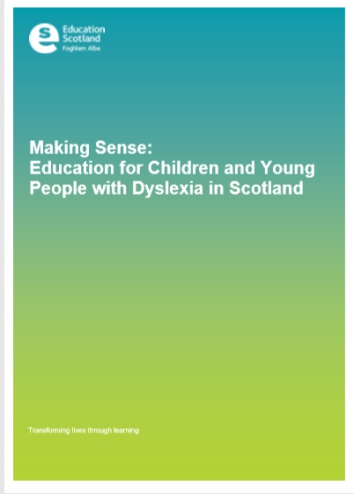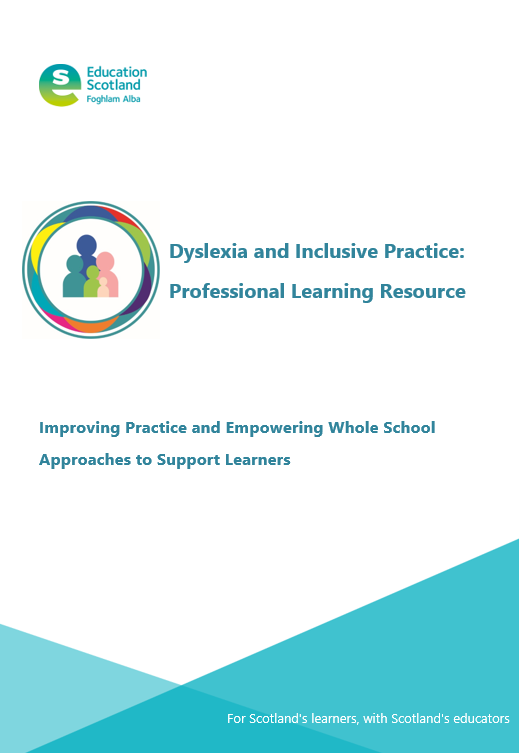Making Sense – Dyslexia Review

Making Sense Report
The 2014 Education Scotland report ‘Making Sense: Education for Children and Young People with Dyslexia in Scotland’ was the outcome of an independent review of education for children and young people who have dyslexia, carried out on behalf of the Scottish Government.
The report identified 5 interconnecting recommendations for local authorities and schools including better sharing of information on young people with dyslexia among relevant professionals, and the need to take action to improve education outcomes for young people with dyslexia. A Ministerial response was published in June 2014 setting out Ministers’ intentions regarding each of the recommendations and the Making Sense Working Group was established to support the implementation of the recommendations through partnership working.
Recommendations
- Teachers, support staff, learners and parents should have access to up-to-date practical advice and guidance on dyslexia.
- Teachers, support staff and local authority staff should have access to a wide range of high quality career-long professional learning opportunities at school, at a local and national level related to meeting the needs of children and young people with dyslexia.
- Initial teacher education and postgraduate awards and courses should give a high priority to developing knowledge and skills in relation to dyslexia and additional support needs.
- Schools, local authorities and national partners should take action to improve the quality of educational outcomes for children and young people with dyslexia.
- The availability and use of reliable information on children and young people’s needs, development and achievement should be improved.
The Making Sense report recommendations combine and support the:
- Increased use of the Addressing Dyslexia Toolkit
- Revised GTC Scotland Standards
- Amended Additional Support for Learning Act.
The Making Sense Programme Final Report and Progress
The Making Sense Final Report was launched by the Deputy First Minister Mr John Swinney on the 30th January 2020. The report outlines the positive progress made in supporting the implementation of the five recommendations. An Executive Summary is also available. A range of resources set within the Scottish context have been produced to support ongoing improvement in the identification and support of learners with dyslexia.
Mr Swinney said:
“We want all children and young people with dyslexia to reach their full potential. That means all teachers must know how to understand the barriers dyslexia can cause for learning and what support is available.”
Supporting the implementation of the five interlinking recommendations and additional achievements within the programme was made possible through the positive collaborative partnerships within the Making Sense Working Group and with all the contributing stakeholders.
Under Recommendation One, the Making Sense report says:
‘Local authority websites, including guidance for parents, must contain information and contact details relating to provision for children and young people with additional support needs, including those with dyslexia, in line with responsibilities under section 26 of the Additional Support for Learning Act.’
The Making Sense Working Group produced a Dyslexia Checklist to help local authorities to ensure that their websites include appropriate guidance, information and contact details relating to provision for children and young people with dyslexia. Click here for this useful Checklist.
Dyslexia and Inclusive Practice
The Making Sense report highlighted that we have increasingly inclusive schools in Scotland and the positive outcomes which can be achieved through a whole-school approach which focuses on dyslexia friendly and inclusive practices. There is a need to ensure that we are making sense of education for every child and young person with additional support needs, including dyslexia, wherever they are educated in Scotland.
Dyslexia Friendly Practice is an important element of Inclusive Practice which represents approaches to learning and teaching which are child centred and which also support inclusive practice for all learners.
The Dyslexia and Inclusive Practice: Professional Learning Resource has been developed to support all five recommendations from the Making Sense report. There is a particular focus on Recommendation 4 and in particular 4.4. which explores developing a dyslexia friendly school award. Stakeholder engagement identified that the most effective model to support schools and local authorities to improve the educational experience for their learners was to focus on dyslexia and inclusive practice and not a national accreditation scheme. There was consensus that the pedagogy and approaches which support dyslexic learners are in fact ‘good learning and teaching’ and are supported by the existing self-evaluation framework.
The resource focuses on eight key areas highlighted by stakeholders which would support improvements in the outcomes for all learners including learners with dyslexia. This is supported through effective, inclusive practice. The selection of these areas is also supported by a range of evidence from inspection, research and project work carried out by the European Agency for Special Needs and Inclusive Education. Further information on this resource is available in the Inclusive Education page of the Toolkit.

